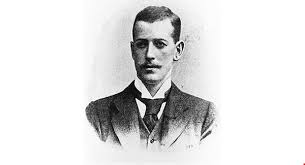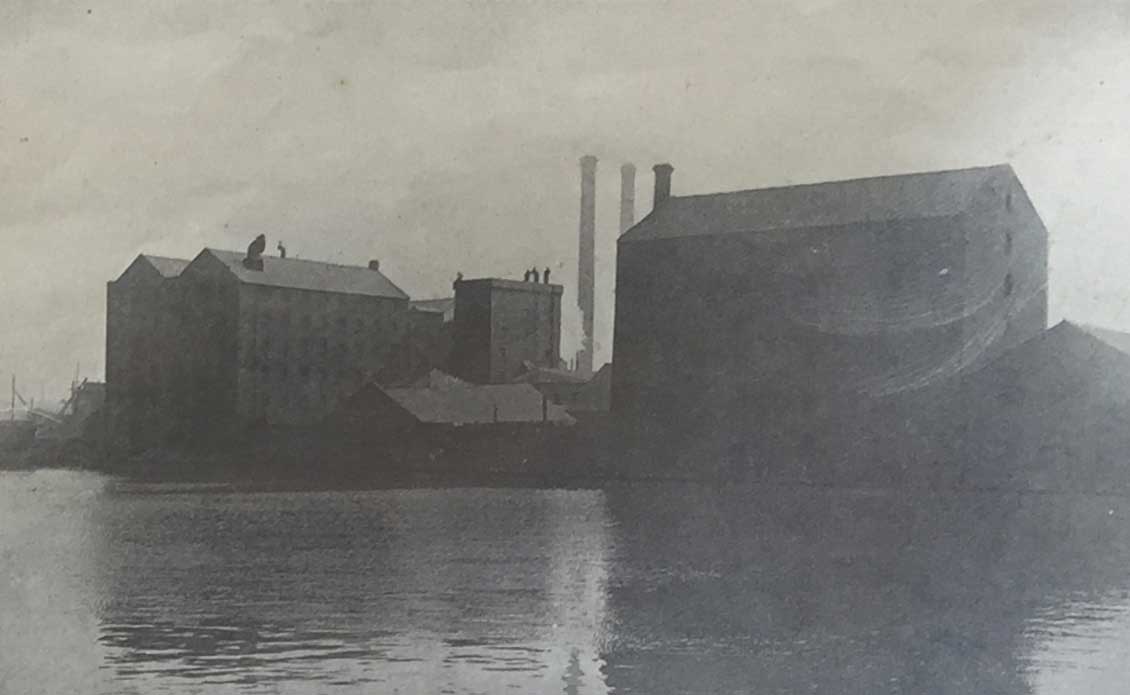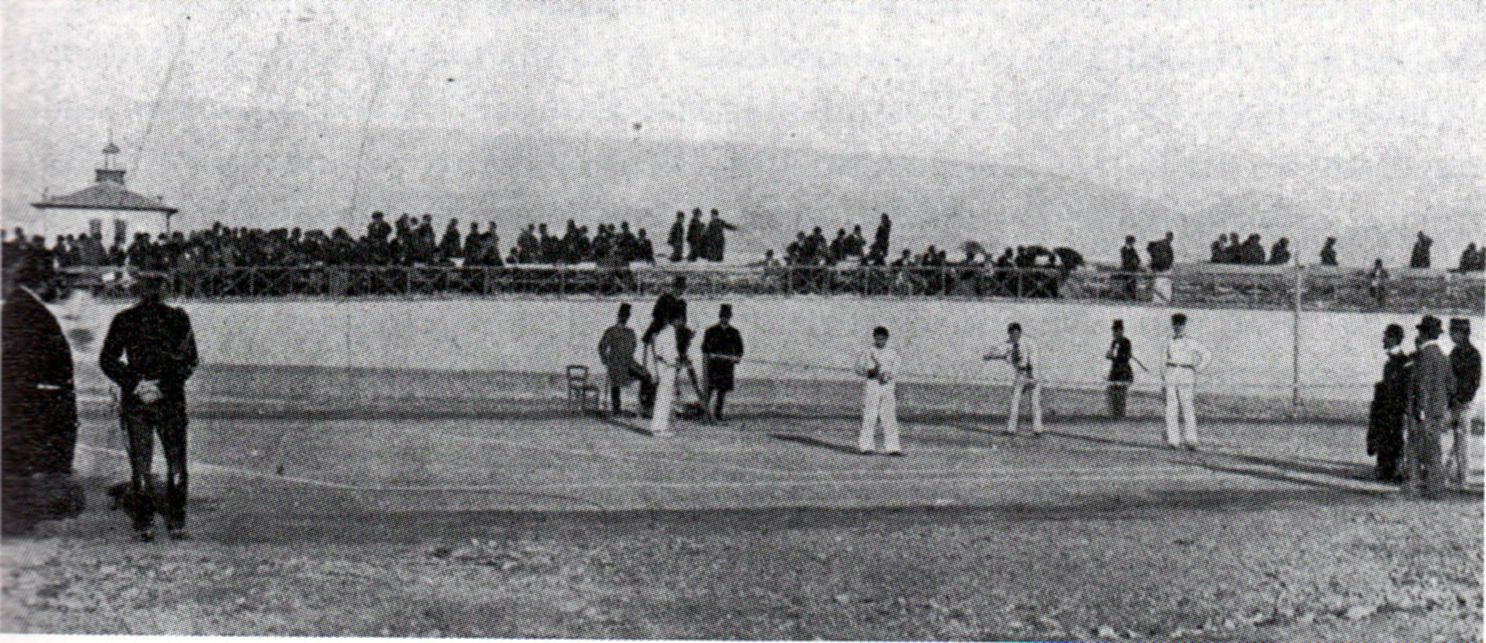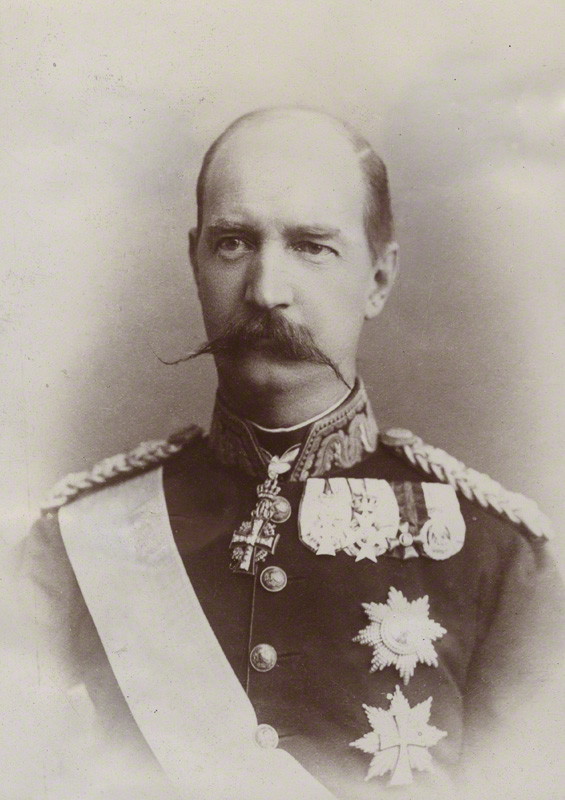As it all kicks off tonight, I’m going to re-post this tonight, to say hello Rio, and good luck to the Scotsman……

I came across all of this during the Wimbledon fortnight this year, and it amused me. J.P. Boland turned up to a few family funerals in the 1920’s. He has the enormous distinction of being the first Olympic champion in tennis, and a double gold medallist, winning both the men’s singles, and doubles in Athens in 1896, and he beat the Australian.
I’ve spent a short while trying to work out what he was, and concluded in the end that, in the effortless way we adopt people, that the best description is, probably, he was a Londoner. The evidence is all pretty convincing for me.
He represented Great Britain and Ireland in the men’s singles , he was part of an Anglo-German duo in the doubles. He was born in Dublin, went to school in Ireland, and England, went to London University. Lived and worked most of his life in London. Died at home in London on St Patrick’s Day 1958. He was an Irish Party M.P. in the House of Commons for eighteen years (1900 -1918, a firm supporter of Home Rule, a member of the commission for the foundation of the National University of Ireland, and for more than twenty years General Secretary of the Catholic Truth Society. His son-in-law, and one daughter were both Fianna Fáil TD’s, and another daughter Bridget Boland was a playwright, novelist, and screenwriter who summed up the confusion quite well in 1988, when she said “Although I hold a British passport, I am in fact Irish, and the daughter of an Irish politician at that, which may account for a certain contrariness in my work.” Finally, he had a papal knighthood, and an honorary doctorate from the NUI.So more correctly, Dr J.P.Boland, K.S.G, BA (Lond),MA (Oxon), LLD (NUI).
Now make of the above what you will. To me he’s a Londoner, if you’re from Dublin, he’s almost certainly a Dubliner. If you’re Irish, then he’s almost certainly an Irishman. Indeed the Irish Examiner, fudged it nicely in April this year to use him for the claim “an Irish- born athlete has competed at every staging of the summer Olympic Games since 1896.” . If you’re English, he is probably British, in the shameless way a British man wins Wimbledon, and a Scot is the heroic runner-up.
That only leaves the Anglo-German win in the doubles………………..

John Mary Pius Boland, (1870-1958), was born at 135 Capel Street, Dublin, to Patrick Boland and Mary Donnelly; after the death of his mother in 1882, he and six siblings became the wards of his uncle Nicholas Donnelly, the auxiliary bishop of Dublin. The Bolands controlled one of Ireland’s leading baking and flour-milling companies. In 1916, Boland’s Mills was seized by members of the 3rd Battalion of the Irish Volunteers led by Éamon De Valera: perhaps as few as 100-130 poorly armed Volunteers were involved. This complex of buildings was situated in south Dublin, near Grand Canal Dock and overlooking the Grand Canal itself (the current Treasury Building is built on the site of the original mill). It was strategically important because it contained important transport links that connected Dublin to the southern ferry port of Kingstown (Dún Laoghaire): the rail terminus at Westland Row, and the roads leading into the city that crossed the Grand Canal at Mount Street.
But, we’re really concerned with the events in Athens, twenty years, and thirteen days earlier. JP kept a journal in which he also recorded his Olympic visit. The long-lost journal was found in 1994 and is now in the IOC’s archive in Lausanne.
JP spotted a notice in the Oxford Union about the proposed Olympic revival. He was fascinated, and “straightway determined to be present if possible at these Games’” and he played a minor role in spreading the Olympic gospel. Konstantinos Manos, one of the secretaries of the organising committee for the Athens Games was a freshman at Oxford in 1895. Boland contacted Manos and organised a breakfast party at the Union with some of his athletic friends at which “kippers, grilled chicken and curried sausages, omelette, coffee, toast and preserves” were consumed as Manos explained the Olympic concept to the guests.
Boland was studying at the University of Bonn from mid-October 1895 to mid-March 1896, on a sabbatical from Oxford. During his time in Bonn, he completed hardly any sport, apart from playing a round of golf and participating in three football matches. His only mention of tennis in his journal is the fact that the courts were flooded, and iced over in winter for skating.
JP left Bonn on March 14, 1896, with Alfred Pazolt as his travelling companion and completed a slow tour of central and south-east Europe on his way to Athens. St Patrick’s Day was celebrated in Munich “with a glass of beer at the Hoffbrauhaus”. They spent three days Vienna sightseeing, and going to the Opera, the theatre and a performance of Much Ado about Nothing. In Patras, they “explored the town & old Venetian fortress”, before arriving in Athens on March 31. They had organised the trip through Thomas Cook and stayed at the , a one of the best and most expensive in Athens, where they “couldn’t have been better off. Two first floor rooms in an excellent hotel in the centre of everything, wine included, meals when one liked and the choice of 14 or 15 dishes for 20 francs a day.”
He clearly had no intention of competing at Athens. He played recreational tennis , but had had some coaching at school when he was at the Oratory School. The sport was “decidedly inferior’’ to cricket as far as Boland was concerned. A dinner conversation with an English-speaking Greek from Alexandria, Dionysios Kasdaglis, on 6 April 1896 inspired a decision that was to create Olympic history.
Kasdaglis informed Boland that few players had entered the tennis competition and he agreed to partner his dinner companion in the doubles and also enter the singles. However, for the men’s doubles, JP was paired with Friedrich Traun, a German athlete, who was competing in the 800m. Boland was “totally unprepared for tennis” and spent the following day frantically “hunting up the various requisites”. “A tennis bat of sorts was easily secured at the Panhellenic Bazaar in the Rue de Stade, but tennis shoes were not to be had in Athens”. so he had to play in a pair of ordinary shoes, with leather soles and heels.
The thirteen competitors who entered for the tennis competitions formed a strange bunch, and included a Serbian weightlifter and Greco-Roman wrestler “who had only the most rudimentary notion of playing” according to Boland; his own doubles partner was a German 800m runner. The entries also included George Stuart Robertson, an English hammer thrower and Edwin Flack, the Australian 800 and 1500m Olympic champion. Kasdaglis represented Egypt and the remainder of the field were Athenian tennis players.

He beat three Greek opponents to qualify for the final, held on April 11 , where he won (6-2, 6-2) beating the man who encouraged him to enter, Dionysios Kasdaglis. He had considered withdrawing from the final but felt he “could not scratch as the game was of an international character”.
Immediately before the men’s singles finals, Boland and Traun, defeated Kasdaglis and his partner, Demetrios Petrokokkinos, 6-3, 5-7, 6-3 to win the men’s doubles title. It’s still pretty impressive, playing five sets, back to back, over two matches, even if it is against an opponent who’s doing the same thing. Even so, breaking your opponent twice in each set is a pretty comprehensive win, and even more so in leather soled shoes.

At the Closing Ceremony on April 15, all the Olympic champions were presented with their prizes by King George 1st of Greece, the grandfather of the Duke of Edinburgh. Each winner received “a huge diploma in a large circular cardboard case, a medal in a case and a branch of olive a couple of feet long that had been “brought especially from Olympia itself. “
A number of myths have attached themselves to his achievement; quite clearly he was not invited to compete by his Oxford acquaintance Konstantinos Manos, neither did he travel to Athens with a group of Oxford students and most importantly of all he did not engage in any type of nationalist demonstration after his victories. Even so, the myth is that when the Union and German flags and the flag were hoisted to honour Boland and Traun’s victory, Boland pointed out to the man hoisting the flags that he was Irish, adding “It [the Irish flag]’s a gold harp on a green ground, we hope.” It’s not a Tommie Smith and John Carlos moment, but it’s also a telling pointer of the complicated relationship between two countries, an Irish born, British subject, co-operating with a German, and winning in Europe. For me, that pretty much makes the case for John Mary Pius Boland being a definite Londoner.
One thought on “An Irish Olympic Tennis Champion 1896”